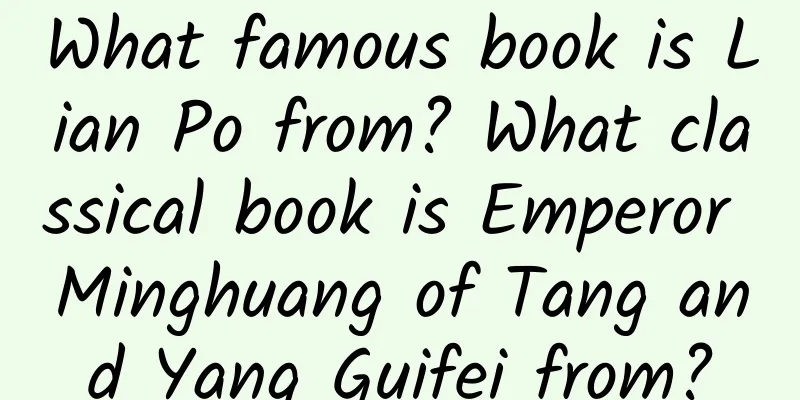What famous book is Lian Po from? What classical book is Emperor Minghuang of Tang and Yang Guifei from?

|
There are many important characters in the Four Great Classics, which are hard to remember and distinguish. Today, let's take a look at which classics they are from. First, which classic is Lian Po from? Second, which classic is Dou Erdun from? Third, which classic is Emperor Minghuang of Tang and Yang Guifei from? Have you gained new knowledge? Contents of this article 1. Which famous book is Lian Po from? 2. Which famous book is Dou Erdun from? 3. What classical novel did the story of Emperor Minghuang of Tang and Yang Guifei come from? 1Which famous book is Lian Po from?Lian Po is a character in "Records of the Grand Historian: Biographies of Lian Po and Lin Xiangru". Introduction: Lian Po, whose birth and death years are unknown, was a famous general of the State of Zhao during the Warring States Period. He was from Kuxing, Zhao. His surname was Ying and his clan name was Lian. His given name was Po. He was a famous general of the State of Zhao during the late Warring States Period. He was known as one of the four famous generals of the Warring States Period, along with Bai Qi, Wang Jian, and Li Mu. Life story: In 283 BC, he led troops to attack Qi and won a great victory, captured Yangjin, and was named Shangqing by the King of Zhao. Lian Po was famous among the vassal states for his bravery and courage. In the early stage of the Battle of Changping, he successfully resisted the Qin army by defending. Nine years after the Battle of Changping, he repelled the invasion of Yan, beheaded the Yan army commander Li Fu, marched to besiege the capital of Yan for three months, and forced the other side to cede five cities to seek peace. As a result, he was appointed as prime minister and was named Xinping Jun. During the reign of King Zhao Daoxiang, he was frustrated and fled to Wei and Chu successively. When he fled to Wei, he lived in Daliang, and then died of old age in Chu and was buried in Shouchun. During the reign of Emperor Dezong of Tang, Lian Po and other 64 famous generals with outstanding military achievements in history were enshrined in the Temple of King Wucheng, and were called the 64 generals of the Temple of King Wucheng. During the reign of Emperor Huizong of Song, Lian Po was posthumously honored as the Earl of Lincheng, and was listed as one of the 72 generals in the Temple of Song Wu. 2Which famous book is Dou Erdun from?Dou Erdun is from "The Complete Biography of Shi Gong'an" and "The Case of Peng Gong". Dou Erdun was born in Xian County, Hebei Province, and his original name was Dou Kaishan. He had an older brother, the second child, who was strong and muscular, so he was also called Dou Erdun. He was born in poverty, and his father Dou Zhizhong was a general under Li Zicheng, a peasant uprising army in the late Ming Dynasty. He was a hero in the Qing Dynasty chivalrous case novels "The Complete Biography of Shi Gong'an" and "The Case of Peng Gong", and the Peking Operas "The Stealing of the Imperial Horse" and "The Serial Trap". He was finally executed by the Qing government. There is no record of Dou Erdun in the two basic official history books of the Qing Dynasty, "Draft History of Qing Dynasty" and "Veritable Records of Qing Dynasty". He is only mentioned in the "Ming and Qing Historical Materials" of the Institute of History and Philology, Academia Sinica of the National Government, and in local chronicles such as "Ancient City of Aihui" and "Xian County Chronicles". 3What classical novel did Emperor Tang Minghuang and Yang Guifei come from?1. "Complete Tang Poems": The full name is "Complete Tang Poems Compiled by the Emperor", which is a collection of Tang poems compiled by the Qing Dynasty. The book has 1,000 volumes, and the first four volumes, which include 18,488 articles from the Tang Dynasty and the Five Dynasties and Ten Kingdoms, and 3,042 authors. Each author is accompanied by a biography. From the 13th to the 19th year of Jiaqing, Dong Gao led the compilation, and more than 100 people including Ruan Yuan and Xu Song participated in the compilation; 2. "The Story of the Song of Everlasting Sorrow": It is a legendary novel with historical themes. It consists of one volume and was written by Chen Hong. It traces the story of Concubine Yang entering the palace during the Kaiyuan period, her death at Mawei Slope on the way to Sichuan with Emperor Xuanzong after An Lushan's rebellion, and the encounter between the Taoist monk and Yang Zha in heaven. The plot is the same as that of "The Song of Everlasting Sorrow", but Bai Juyi used the form of poetry while the author used the form of prose, which complements each other. 4. "Wutong Rain": This is a famous work by Yuan Dynasty playwright Bai Pu. Its full name is "Tang Minghuang Autumn Night Wutong Rain". It is a historical drama describing the love story between Emperor Tang Minghuang and Yang Guifei. This play is based on the legendary novel "The Story of Song of Everlasting Sorrow" by Chen Hong of the Tang Dynasty and the poem "Song of Everlasting Sorrow" by Bai Juyi. The title is also taken from the line "Spring breeze peach and plum blossoms bloom, autumn rain Wutong leaves fall". |
Recommend
How to deal with the various symptoms of menopause?
Generally, women will slowly enter menopause afte...
What does it mean when a girl has long sweat hair?
Body hair is something that everyone has, not onl...
Light bleeding and abdominal pain in early pregnancy
Most pregnant women will pay special attention to...
Why is Flammulina velutipes named “Jin”?
Flammulina velutipes, also known as winter mushro...
When is the best time to drink milk? The wrong time means drinking in vain
Milk contains very comprehensive nutrients, espec...
When is the best time for pregnant women to do thyroid exercises?
A woman's physical health during pregnancy is...
Pregnant women dream of red apples, it means a boy
Apple is a common fruit in our daily life and is ...
What are the treatments for menstrual pain?
Menstrual pain is a common problem for many women...
How to improve leg cramps in late pregnancy
Leg cramps, foot cramps, and abdominal cramps are...
Should women replenish blood during menstruation?
Today, I’m going to introduce to you the content ...
Demonstration of squatting exercise in late pregnancy
How do pregnant women do squat exercises? Regardi...
What are the symptoms of qi and blood deficiency?
Qi deficiency and blood deficiency have a great i...
Abdominal pain on the first day of menstruation
At present, there are many female friends sufferi...
What causes green vaginal discharge?
Leucorrhea is a barometer of women's physical...
How to relieve work pressure, maintain a good attitude towards life, and promote physical and mental health?
In real life, pressure from work or family always...









